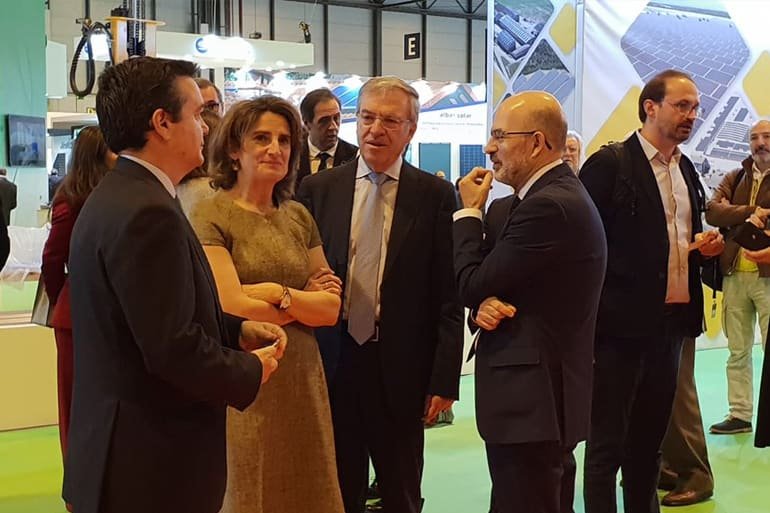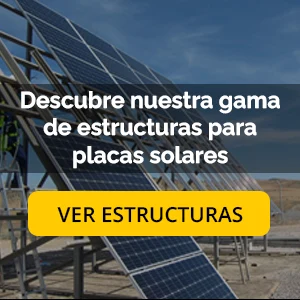That is the forecast of the Spanish Photovoltaic Union, an association of companies (producers, installers, engineering firms, manufacturers) that represents 85% of the actors in the national PV sector.
“Self-consumption -explains UNEF- represents 90% of the new power installed in 2017 (235.7 megawatts out of a total of 261.7) and in the coming years will account for 15-20% of the new annual installed power.”
The Integrated National Energy and Climate Plan that the Government has just presented has set as a 2030 Objective that Spain reach 37,000 megawatts of installed photovoltaic power by that date, which would mean an annual increase of 3,000 megawatts. UNEF, for its part, has already announced that it has “the will and capacity to invest and develop” the announced 37,000 MW; and on Friday, it also issued a statement in which, on the one hand, it takes stock of the Genera fair (which has just been closed) and, on the other hand, advances its forecast for the growth of self-consumption in Spain, which it estimates “will account for 15-20% of the new annual installed power”, that is, between 450 and 600 megawatts per year if Spain meets its 2030 Objectives, recently established in the NECP of Energy and Climate that the Government has just presented for submission to Brussels.
The International Energy and Environment Fair (Genera) 2019, which has just been closed, has had an absolute protagonist: self-consumption. For four days, that has been the key word, the one that has run the most from mouth to mouth. The Government wanted to heat up the fair with a Framework Conference focused precisely on that issue, a conference with a title as long as it is entertaining: «Energy transition, among all. Self-consumption as the key to change». The Framework Conference has been specifically organized by the Institute for Diversification and Energy Saving, which has prepared a program through which up to 40 speakers have paraded. The most anticipated, the Secretary of State for Energy, José Domínguez Abascal, who has suggested that the Royal Decree (RD) on Self-Consumption will reach the Council of Ministers before the Sánchez Government ceases to be so.
Three technical conferences
During the first of the Technical Conferences convened by UNEF and FotoPlat -Success Stories of Self-Consumption-, the specific regulatory framework for self-consumption has been deepened, specifically, the draft RD of Self-Consumption pending approval and the possibilities of processing installations with the current available framework. The experts from different areas of self-consumption have agreed -explain from UNEF- on the need to qualify and clarify aspects of the RDL 15/2018 relating to the administrative and technical conditions of connection to the network and compensation mechanisms for surpluses developed in the RD of Self-Consumption pending approval, “to avoid legal loopholes and errors of interpretation that could paralyze the development of self-consumption”.
In this sense, the General Director of the Institute for Diversification and Energy Saving, Joan Herrera, has stated “that the primary objective is to give exit and approval to the RD of Self-Consumption before the end of the legislature to ensure that proximity and collective self-consumption have a real scope”. Herrera has also added that “a transformation relationship between the citizen and the energy itself is necessary, so that the citizen learns to adjust their demand curves and is not a mere spectator of the energy transition” and that “self-consumption involves providing citizens with the necessary tools to become actors in the fight against climate change and offers the photovoltaic sector the possibility of making this participation effective”.
For his part, the general director of UNEF, José Donoso, has highlighted “the constant effort that the sector has made jointly to achieve all the progress obtained”, and that it is now when it will begin to reap its rewards. Donoso has advanced on the other hand that “self-consumption in the coming years will account for between 15-20% of the new annual installed power”.
Other conclusions, according to UNEF
During the Technological Challenges Conference, organized in collaboration with FotoPlat, the Photovoltaic Technological Platform, Donoso has stressed “the important role played by the commitment to R&D in reducing costs to achieve a greater increase in electricity production per hectare”.
The aforementioned Technological Conference has focused on the Circular Economy, the stability of the network in Low Voltage and in storage. The experts have mentioned the need to create smart grids that supervise and monitor energy flows, the new Connection Codes and on the variability of the solar resource and how to offer solutions that minimize the effects of its seasonality.
Regarding storage, professionals consider its impulse “key to the development of self-consumption” and agree that batteries for self-consumption have evolved visibly, being these more compact and efficient.
In the Photovoltaic Project Financing Conference, the Spanish banking -reports UNEF- has shown to be willing to finance photovoltaic projects in Spain, but has clarified that the participation of international banking is necessary (in this Technical Conference there have been representatives from Bankinter, Acofi, Suma Capital, Triodos Bank, among others).
Experts agree that the current market price fixing model does not project an adequate price image, so a reform would be necessary.
Regarding the profitability of investments, analysts estimate that the profitability of investments in photovoltaics ranges from 6% with reduced risks and 20% with high risks.
And, in conclusion, transactions in photovoltaics worldwide are growing exponentially, from 13% of the total in 2008, they have gone to 35% in 2017 and in 2018 they have reached 50%, which shows the international interest and commitment to renewable generation of photovoltaic origin.
About UNEF
The Spanish Photovoltaic Union (UNEF) is defined as “the sector association of solar photovoltaic energy in Spain, an association that is made up of more than 320 companies, entities and groups from the entire value chain of technology, which represent more than 85% of the activity of the sector in Spain and which brings together practically all of it: producers, installers, engineering firms, manufacturers of raw materials, modules and components, distributors and consultants”. UNEF also holds the presidency and co-secretariat of FotoPlat, the Spanish photovoltaic technology platform, which brings together the universities, research centers and leading companies of photovoltaic R&D in Spain.
Source: energias-renovables.com




